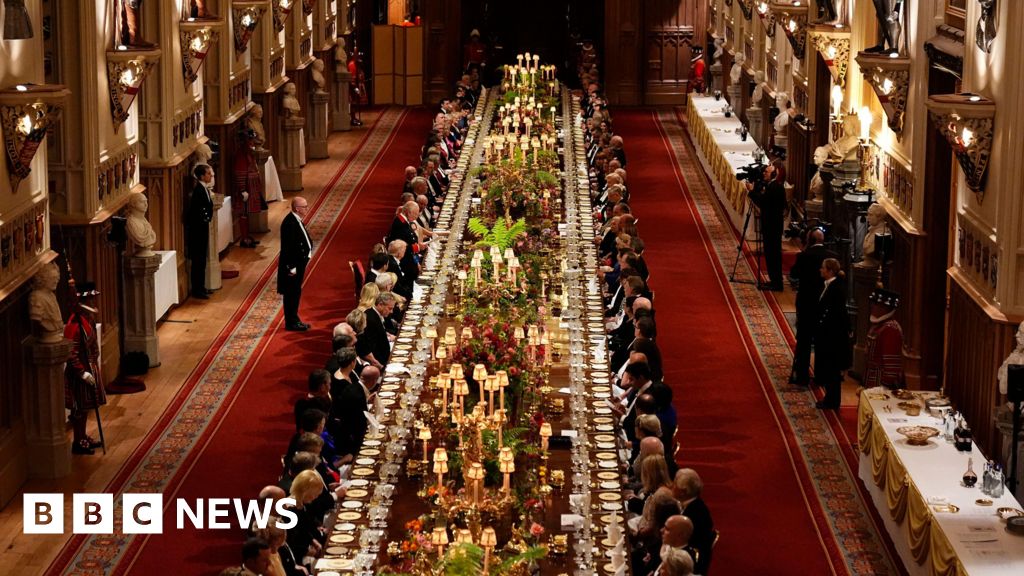
Royals, Maga and tech CEOs: What we learned from state banquet guest list

Royals, MAGA, and Tech CEOs: Insights from the State Banquet Guest List
On a grand evening at Windsor Castle, 160 esteemed guests gathered for a state banquet honoring the unprecedented second visit of U.S. President Donald Trump to the United Kingdom. This event, held beneath the ornate portraits and suits of armor that adorn the historic venue, was not only a showcase of fine dining but also a carefully orchestrated diplomatic affair. The guest list, which notably lacked the presence of celebrities and high-profile entertainers, was dominated by royals, tech executives, and political figures from both sides of the Atlantic.
A Diplomatic Gathering
The seating arrangements at the banquet were meticulously planned, reflecting the intricate web of relationships and power dynamics at play. President Trump occupied a place of honor at the center of the table, seated next to his host, King Charles III. The composition of the guest list revealed a focus on influence and wealth, with prominent figures from the business world and political spheres sharing the table.
Among the notable attendees were leaders from the tech and finance sectors, including Tim Cook, CEO of Apple; Jensen Huang, CEO of Nvidia; Sam Altman, CEO of OpenAI; Stephen Schwarzman, CEO of Blackstone; and Rupert Murdoch, the owner of Fox News. Murdoch’s presence was particularly intriguing, given that Trump is currently engaged in a legal battle with one of Murdoch’s publications over allegations related to a note involving Jeffrey Epstein. Despite this, Murdoch was seated next to Morgan McSweeney, the chief political strategist for UK Prime Minister Sir Keir Starmer.
The Power of Investment
The banquet was not just a social occasion; it also served as a platform for discussing significant financial commitments. The U.S. business leaders in attendance announced a staggering £150 billion investment in the UK over the coming years, with over half of that amount—£90 billion—coming from Blackstone. This investment raises questions about the expectations tied to such financial commitments. The UK government has stated that it does not intend to alter its digital services tax or dilute the Online Safety Act in response to these investments, framing the relationship with U.S. businesses as akin to the UK’s alliances in defense and intelligence.
However, some critics, including former Deputy Prime Minister Sir Nick Clegg, have expressed concerns that the influx of U.S. investment could lead to the UK becoming overly dependent on a select group of American companies, potentially compromising its sovereignty.
Trump’s Entourage
A significant portion of the banquet’s attendees were members of Trump’s entourage, with nearly two dozen seats occupied by his family and senior officials from his administration. Melania Trump, the First Lady, was seated directly across from her husband, flanked by Queen Camilla and the Prince of Wales, William. Catherine, the Princess of Wales, was positioned next to President Trump, creating a tableau of royal and political engagement.
Among Trump’s children, Tiffany Trump was the only one present at this state banquet, accompanied by her husband, Michael Boulos. Tiffany has been less involved in her father’s administration compared to her older siblings. Michael Boulos, who has ties to London through his education, was seated near the Princess of Wales, indicating a blend of personal and political connections.
Notable figures from Trump’s administration included Secretary of State Marco Rubio, who enjoyed a prime seat next to King Charles, and Steve Witkoff, a real estate mogul and Trump’s special envoy. Witkoff’s role in foreign policy discussions regarding Ukraine and Gaza likely provided ample opportunity for dialogue with Jonathan Powell, Starmer’s National Security Adviser.
The Royal Presence
The royal family played a pivotal role in the event, with King Charles III seated next to President Trump and Secretary Rubio. Queen Camilla was positioned across the table, next to the First Lady, while the Prince of Wales engaged in discussions with Paula Reynolds, chairwoman of National Grid, on local matters.
Princess Anne, known for her equestrian interests, was seated next to racehorse trainer John Gosden, further emphasizing the blend of personal interests and diplomatic discussions at the banquet. Other royals, including Vice Admiral Sir Timothy Laurence, the husband of Princess Anne, were seated next to key figures from Trump’s administration, showcasing the intertwining of royal and political circles.
Conclusion
The state banquet at Windsor Castle was a significant event that highlighted the complex interplay of politics, business, and diplomacy. The carefully curated guest list, devoid of celebrity presence, underscored the focus on power and influence, while the discussions surrounding substantial investments in the UK raised important questions about the future of the country’s economic independence. As the UK navigates its relationship with the U.S. amidst global challenges, the dynamics observed at this banquet will likely resonate in future diplomatic engagements.
Key Facts
– The state banquet honored U.S. President Donald Trump’s second state visit to the UK.
– The guest list featured 160 attendees, primarily comprising royals, tech executives, and political figures.
– Notable guests included Tim Cook (Apple), Jensen Huang (Nvidia), Sam Altman (OpenAI), and Rupert Murdoch (Fox News).
– U.S. business leaders announced a £150 billion investment in the UK, with £90 billion from Blackstone.
– Trump’s entourage included Melania Trump, Tiffany Trump, and key administration officials like Marco Rubio and Steve Witkoff.
– The event highlighted the intersection of politics, business, and royal diplomacy.
Source: www.bbc.com
